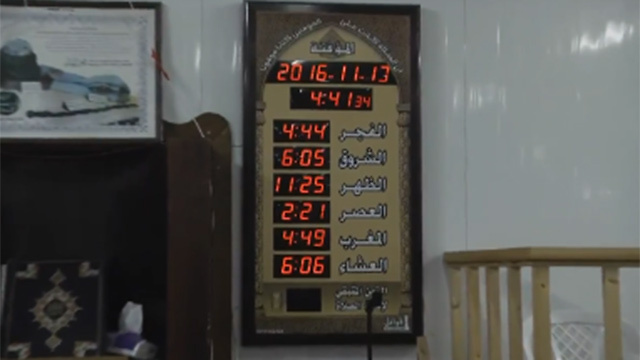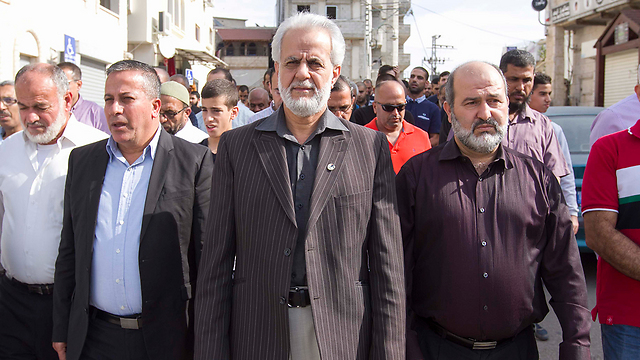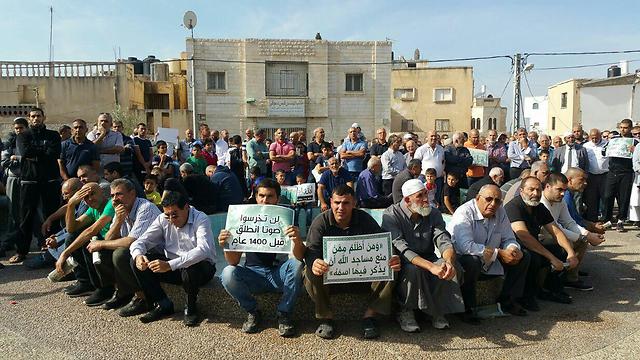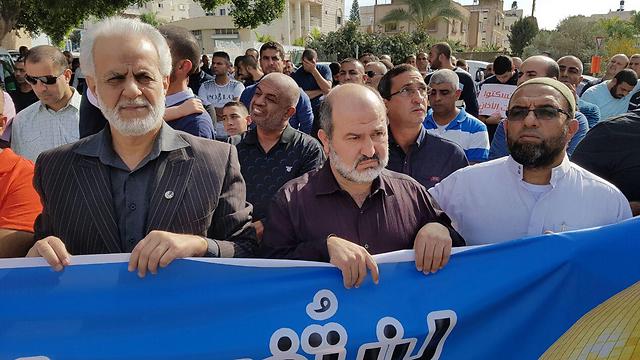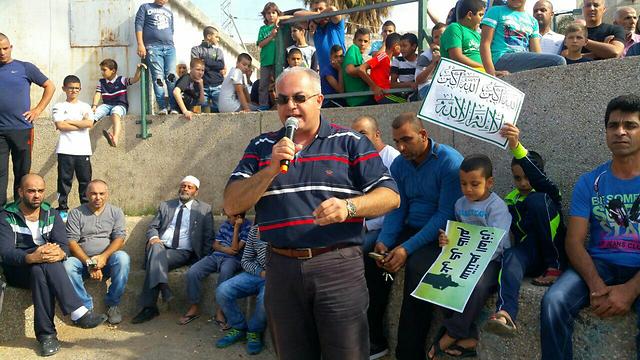
Friday protests
צילום: עידו ארז
Thousands of Arab Israelis protest 'Muezzin Bill' after Friday prayers
In various cities throughout Israel, citizens took to the streets to express their opposition to legislation aiming to ban calls to prayer from being transmitted by loudspeaker; 'We were born with "Allahu akbar," and we'll continue saying, "Allahu akbar."'
Some 2,000 protested on Friday against the "Muezzin Bill" in Kafr Qasim, Tayibe, Kabul, Kafr Kanna and Rahat.
They called to end the legislative process that aims to prevent mosques from using loudspeakers to announce prayer times after leaving Friday prayers. They waved banners that read, "Silence the voice of racists, not the voice of the muezzin" and "A racist law," and cried, "The voice of the muezzin will not be stopped; such a law will not be followed."
Kafr Qasim's mayor, Adel Badir, joined those protesting in his city. He said, "Here, at this place where we're demonstrating, 49 martyrs were murdered in a massacre carried out by soldiers." Referencing the words contained in the call to worship that mean "God is (the) greatest," the mayor continued, "We were born with 'Allahu akbar,' and we'll continue saying, 'Allahu akbar.'"
At the beginning of the week, the Ministerial Committee for Legislation approved a bill Sunday evening to ban mosque muezzins from announcing prayer times via loudspeakers in the streets. The bill was submitted by MK Motti Yogev (Bayit Yehudi) and Robert Ilatov (Yisrael Beytenu) after numerous complaints from residents of various cities. The first call to prayer occurs at approximately four or five in the morning every day, disturbing the sleep of local residents.
"We are not opposed to religious observance, and certainly not to the call of the muezzin that 'God is greatest,'' Yogev told Channel 1’s education program. "(Religious Jews have been) reciting a similar phrase for thousands of years, long before the emergence of Islam.
"But with all the technological advances of today, there is no justification for waking people up at 4 o’clock in the morning who don’t want (to attend prayer services). There are cell phone applications, alarm clocks, and other technologies to use. There is no need to wake up the whole neighborhood."
The bill passed an initial reading in the Knesset and then was passed on to the committee stage for further rounds of voting. Prime Minister Benjamin Netanyahu himself voiced his broad agreement with the legislation, commenting, "Muslims, Jews and Christians all suffer from this. I cannot count the number of times that civilians have approached me from all strands of Israeli society who complain about the choice and the suffering which is caused by the excessive noise from houses of worship."
The bill's explanatory notes elaborate, Hundreds of thousands of citizens in Israel in the regions of the Galilee, the Negev, Jerusalem, Tel Aviv-Jaffa and other locations in the center of the country regularly and daily suffer from noise caused by the muezzin's call in mosques."
It also detailed, "This noise is created as the result of using a loudspeaker, which disturbs the rest of citizens multiple times a day, including during the early morning hours and at night."
Yogev added that the bill "brings a worldview according to which freedom of religion doesn't require harming quality of life and suggests that houses of prayer be prohibited from using loudspeakers to call the congregation or to transmit religious or national messages, and sometimes even incitement."
The bill infuriated many Arab Israelis. One Kafr Qasim resident who came to the protest said, "If this racist law passes, quiet will not come. We'll continue to fight with all (our) strength, and it doesn't matter to us what the results may be. Arrests, indictments and investigations won't deter us. The Israeli government must understand that harming the Muslim religion is a red line."
Speaking of the prime minister, he added, "A man who's going in this direction is destroying relations and causing an explosion. He'll be responsible for the outcome. A man like this cannot remain in a position as leader, and he must resign."
Tayibe Mayor Shuaa Mansur also warned about the effects of the legislation: "These extreme measure of the Israeli government is a challenge to the Arab populations, which believes in shared life and freedom of worship. We believe that Jews and Christians too must be given freedom of worship everywhere in the world. I hope that the voice of sanity in this country, including that of the attorney general, will triumph." He said that Netanyahu should "not be dragged over by the extreme right. At the end of the day, you're everyone's prime minister."
A Tayibe resident at the protest said, "The muezzin is an inseparable part of the prayer, which is required of every believing Muslim. Therefore, a proper democratic country should defend its existence and certainly not prevent it, as this is part of the freedom of religion and faith."
Responding to Yogev's call to use different, less intrusive technologies to call the faithful to prayer, another Tayibe resident said, "The voice of the muezzin has become part of the tradition and day-to-day life. In addition, there's tons of people and principally elderly who don't know how to read and write, and certainly not how to use a smartphone. I recommend that the prime minister of Israel deal with other noises, like the noises of planes above populated areas, marriages in illegal locations."










